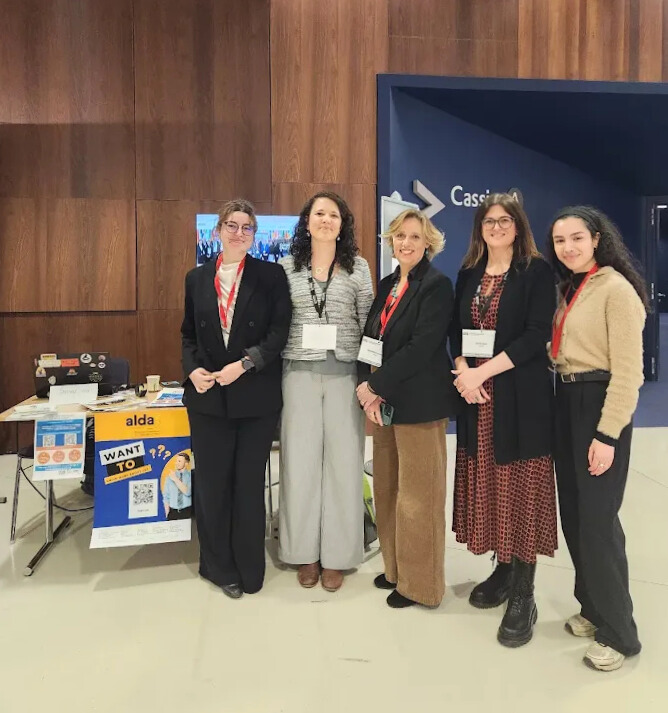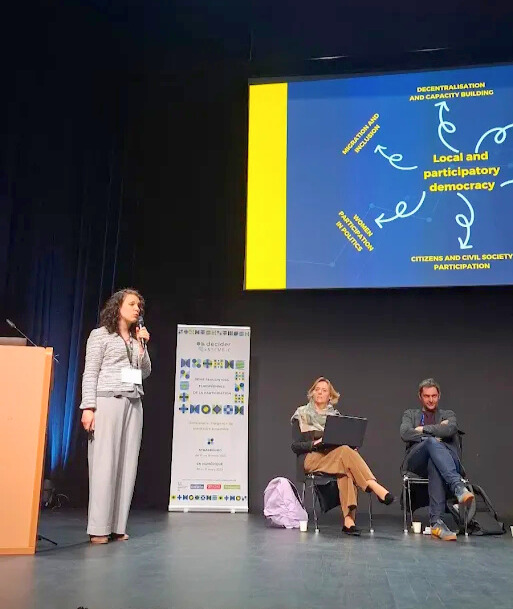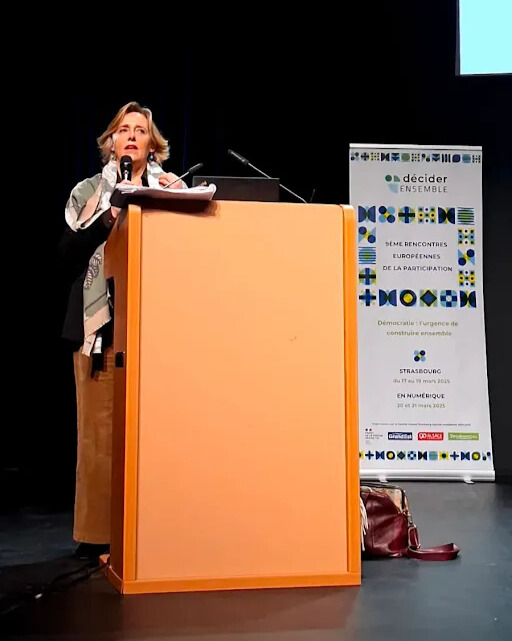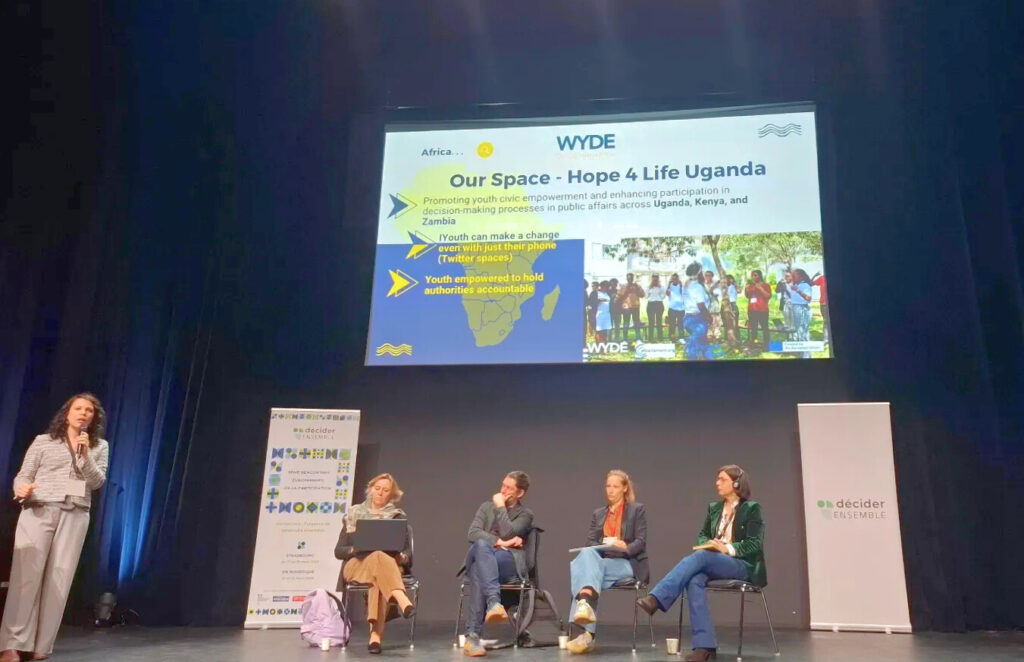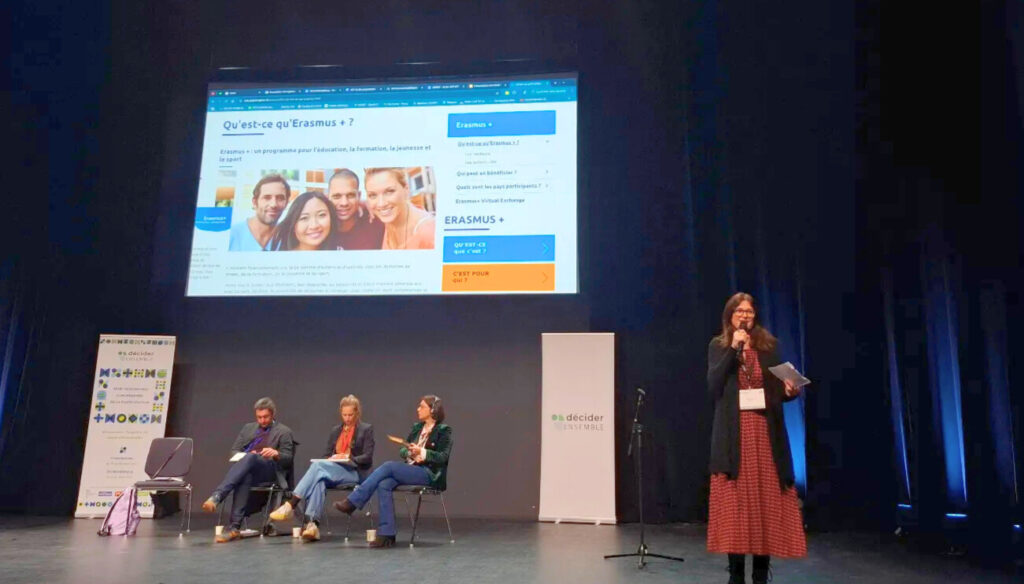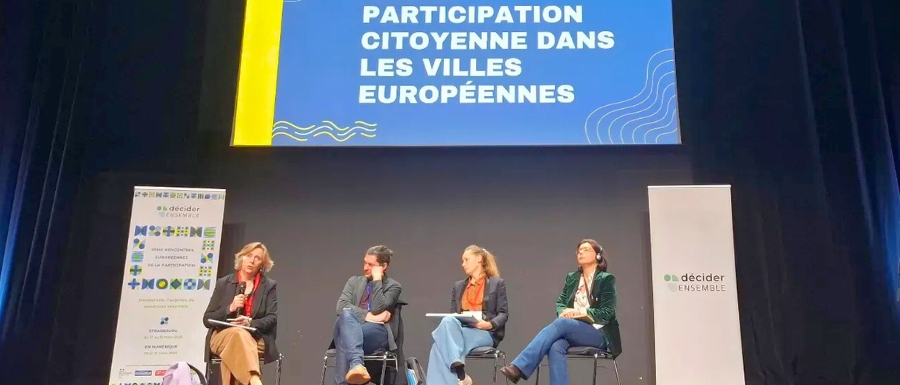From 17 to 21 March 2025, ALDA took part in the «9ᵉ édition des Rencontres européennes de la participation» (9th Edition of the European Meetings on Participation), an annual flagship event gathering key actors of citizen participation across France and Europe, organised by Décider ensemble.
Created in 2005 on the initiative of the then-Minister for Ecology and Sustainable Development, Serge Lepeltier, Décider ensemble is a think tank committed to promoting a culture of shared decision-making and stakeholder dialogue. Over the past two decades, the organisation has become a major hub for exchange and professional development in the fields of public participation, consultation, and co-creation of policies.
The 2025 edition of the Rencontres européennes de la participation was held in Strasbourg from 17 to 19 March, at the Palais de la Musique et des Congrès, followed by two days of online sessions from 20 to 21 March. The event once again served as a dynamic meeting point for practitioners, policymakers, civil society organisations, and researchers.
On 18 March, ALDA contributed to the panel discussion “Participation citoyenne dans les villes européennes” (Citizen Participation in European Cities), highlighting local experiences from its broad network. The session focused on innovative democratic practices across municipalities, showcasing how cities are empowering citizens to actively co-shape local policies.
ALDA presented participatory democracy experiences from #ALDAMEMBERS Valongo Municipality (Portugal) and Etterbeek Municipality (Belgium).
The aim was to create a platform for exchange with participants and develop activities that could strengthen participatory democracy practices to address the current challenges facing democracy.
The panel began with an introduction and ALDA’s presentation by Antonella Valmorbida, ALDA Secretary General. She opened the session by providing a brief overview of ALDA’s 30 years of work, which began in the Balkans under the initiative of the Council of Europe. She explained that the organisation now supports 17 Local Democracy Agencies (LDAs), including initiatives in Ukraine and Eastern Partnership countries. ALDA’s network, comprising 300 members, works across seven thematic hubs: Civic Engagement, Migration, Gender, Inclusion and Human Rights, Territorial and Local Development, Digital and Innovation, and Youth Empowerment and Education. Antonella emphasised ALDA’s commitment to strengthening local democracy and promoting cooperation among EU territories to improve participatory democracy practices.
ALDA’s contribution underscored the importance of local democracy and community engagement in the broader European context.
The first part of the panel involved a moderated discussion, led by Antonella Valmorbida, with two speakers from Etterbeek Municipality in the Brussels-Capital region: David Dubois, Head of the Mayor’s Cabinet, and Marie-Charlotte Heldenbergh, Deputy Head of the Mayor’s Cabinet. Additionally, Susana Gomes, Head of the Culture and Citizenship Department at Valongo Municipality, presented the experience of Valongo.
David Dubois and Marie-Charlotte Heldenbergh presented Etterbeek, a city with 50,000 inhabitants, high population density, and significant turnover, with half of the population being renewed every five years. They conduct numerous micro-participations throughout the year, hold consultations, and utilise all the tools and methodologies they can think of. Sociologically, Etterbeek is described as a city of “the richest of the poor” and “the poorest of the rich,” creating a great social mix. They also highlighted socio-economic factors beyond their control, such as rising material costs and limited budgets. One initiative they discussed was a mobilisation project based on private savings, state bonds, or municipal bonds, run through a crowdfunding platform. This project successfully secured 80 investors, raising 1.2 million euros in just 24 hours, with most investors coming from the local community. A public meeting with 200 attendees featured a live counter displaying the donations.
Given the high turnover of the population, Etterbeek has many interns, academic exchange participants, people here for professional reasons, and others who settle long-term. David Dubois and Marie-Charlotte Heldenbergh mentioned that they received 600 responses from foreign nationals applying to join a citizens’ council. This led to the creation of a community for non-Belgian residents, which today has 1,500 members. They also organise workshops on how Belgium works, covering topics such as the municipalities, the police, and the administration.
Susana Gomes from Valongo Municipality presented the experiences of this medium-sized city in Portugal. Valongo, part of the Porto metropolitan area, is a city with many industrial opportunities. The city’s unique challenge is that many residents work in neighbouring cities but live in Valongo, which affects citizen engagement. Valongo’s participatory initiatives are particularly focused on young people, as the city has implemented various tools for working with students and youth. Susana Gomes emphasised the importance of keeping people informed after they give their opinions. Engaging citizens in the process is not enough—ongoing communication and feedback are key to maintaining participation, particularly among youth who often demand quick answers.
The panel continued with an intervention by Giulia Sostero, ASWAT Department Coordinator at ALDA, who presented several key projects during the session. Giulia started with the presentation of ASWAT Department and AUTREMENT project that focuses on sustainable urban mobility and citizen participation in the Tunisian cities of Kairouan and Mahdia. It includes capacity-building for local governments, public space design, and awareness campaigns to engage citizens. The project aims to promote better urban development, soft mobility (especially biking), and enhance the economic and tourist appeal of the cities. Than she presented another project, WYDE – Women and Youth in Democratic Engagement Civic Engagement, funded by the EU, focuses on empowering youth and women for greater democratic engagement at all levels. It includes a network of projects aimed at encouraging youth participation in civic affairs and strengthening youth organisations. The project advocates for more youth inclusion in society and enhances cooperation between youth civil society and public policymakers. Finally she presented WE ACT Project, that aims to increase the political participation of women and LGBTQIA+ individuals in local politics in Turkey. Supported by the EU, it focuses on improving civic rights and participation, particularly ahead of the 2024 local elections. The project also works to foster democratic debate on gender issues and promote gender-inclusive policies across Turkey.
After a round of Q&A on the added value of participatory democracy in the context of current challenges, particularly concerning disinformation campaigns targeting local elected representatives or specific communities, the discussion delved into how city councils are supporting participatory initiatives and the feedback they are receiving from citizens.
The final intervention was by Anna Ditta, Head of the Programmes and Development Department at ALDA, who concluded the session by presenting several European funding programmes that support participatory democracy, including CERV (Citizens, Equality, Rights and Values) , Erasmus+, and Horizon Europe. She specifically highlighted Erasmus+, explaining that it is a funding programme designed to support a range of activities in education, training, youth, and sport, offering opportunities for students and other groups to implement projects abroad, strengthen their skills, and promote international cooperation.
Antonella Valmorbida closed the session by emphasising the need for deeper engagement in democracy, particularly in today’s complex world. She reflected on how, in such a dynamic environment, people live in different social, economic, and cultural contexts, and it is crucial for democracy to be responsive to these diverse needs. She highlighted the important role that citizens play in shaping the future of their communities and societies, reminding everyone that democracy requires ongoing participation from all.
In the afternoon, ALDA Secretary General, Antonella Valmorbida participated in a panel titled “Take Your Seat at the Table: Connecting Different Levels of Citizen Participation” a workshop organised by the European Commission, OECD, European Movement France, and ALDA.
The panel addressed the topic of how to better connect different levels of citizen participation, from local to transnational. Other speakers included Gaëtane Ricard-Nihoul, Deputy Head of Unit, Citizens’ Dialogue at European Commission, Charlotte Denise-Adam, Policy Analyst/Directorate of Public Governance at OECD, Hervé Moritz, President of the European Movement France, and Emilie Gaychet, Local Development Manager of Les Jeunes Européens – France.
During her intervention, Antonella Valmorbida highlighted ALDA’s active work with local and regional authorities, as well as with associations where citizen participation at the local level is central to their efforts. She posed the question of “how” and to what extent ALDA can offer a voice in the context of decentralisation. Antonella emphasised that Europe is not just a single voice; it is all of us together. It is not the voice of one individual but the collective voice of the diverse population that constitutes Europe.
She stressed the importance of raising awareness about the tools for citizen participation and encouraging their use. ALDA, she noted, represents a wider community and has produced documents with 40 recommendations on the issue of citizen participation. Through the Civil Society Europe network, ALDA is currently representing around 100 organisations to advocate for these matters.
Antonella Valmorbida emphasised the importance of initiative and proactivity, highlighting that it is crucial for people to be familiar with the tools available to make their voices heard – whether through events, white papers, local initiatives, or national thematic networks. One of the main challenges, she explained, is understanding the importance of civic life in our own lives. Consulting and actively participating in the life of institutions, Antonella concluded, is essential for strengthening democracy and fostering a more inclusive society.
The second part of the event included two days of online workshops by several organisations. ALDA Balkans’ workshop took place on March 21, 2025, titled “Citizen Engagement: A Key to Lasting Reconciliation in the Western Balkans.”
The online workshop started with Ivana Velkova, Deputy Head of Unit Western Balkans – ALDA Skopje Office, who opened the session by introducing Stanka Parac Damjanovic, ALDA Regional Programme Coordinator, senior trainer with extensive experience in civil society development, active citizenship education, and local governance. Stanka discussed how to assess citizen participation at the local level, emphasising the need to extend participation beyond a small group. The conversation then turned to the role of creative activites as tools for engaging citizens, highlighting their potential to encourage broader involvement.
The discussion continued moderated by Simona Slavkova, Grant Manager at ALDA, with Simona Bishkoska, Communication Officer at ALDA and Viktorija Postolovska, Project Manager at ALDA, who focused on youth activism and its role in promoting reconciliation, fostering a productive debate on the importance of dialogue and youth participation.
Ivana Velkova concluded the session by presenting BOOST project, a programme aimed at strengthening democratic, economic, and social development in the Western Balkans. BOOST supports civil society through capacity building, financial support in key thematic areas, and promotes active citizenship, gender equality, and dialogue with decision-makers. The programme focuses particularly on empowering young people, especially young women, and strengthening their capacity for active participation across all thematic pillars, including youth & entrepreneurship, rural development & environment, and the preservation of cultural heritage. This project, among others, serves as a concrete example of inclusion, empowerment, and sustainable development, demonstrating how targeted support can lead to meaningful change and greater societal participation.
